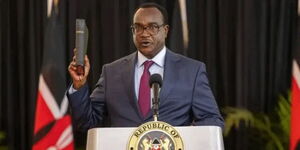Kakamega senator, Boni Khalwale, elicited mixed reactions over his sentiments on the rampant bandit attacks in the Kerio Valley.
On Tuesday, January 3, Khalwale lamented how his bill to curb insecurity in the region was highly opposed in 2006 while serving as Ikolomani Member of Parliament.
The lawmaker announced that he sought to have banditry listed as an offence punishable by death.
“In 2006, I moved a bill classifying cattle rustling as a capital offense punishable by death or life imprisonment.
"Rift Valley MPs marshaled numbers and defeated the bill. Samuel Poghisio (former West Pokot Senator) famously warned me to stick to bullfighting and keep off their local sport,” he stated.
His remarks were, however, not taken lightly as Kenyans felt they were not timely as fresh attacks had left a number of people, including children dead.
Some Kenyans urged him to offer a remedy rather than highlight past efforts made to solve the crisis.
“We need a solution now. We cannot dwell on the past when our people continue to die. Poghisio is no longer in leadership now, but you are. Offer solutions not blame games,” Nyamori Nyamori stated.
Some of his followers felt that the cattle rustling was being conducted by people in authority hence receiving great opposition.
“Cattle rustling is controlled by the political elite who finance the rustlers. The stolen livestock is then sold as legitimate in markets. A study of cattle raids between 2011 and 2020 established that Pokot are responsible for most attacks in the country,” Paul Taiti noted.
The senator was further criticized by others who felt he was afraid of stating that the real person greatly opposed his bill.
“You've never been known as a coward except for now when you have to coil your tail. Why is it so hard for you to mention that President William Ruto was the head of the gatherings that opposed the bill? Ruto promised to end the menace. Why hasn't he?” Onyango Ochieng posed.
On June 9, 2004, Khalwale presented the bill that was rejected. MPs stated that the motion was brought to Parliament for ulterior motives.
“Considering that cattle rustling is a major cause of insecurity in many parts of the country, resulting in loss of property and sometimes loss of life; taking into account that culprits when arrested often walk into freedom as a result of the right to bail and light custodial sentences; this house to grant leave to introduce a bill for an Act of Parliament to amend the relevant sections of the Penal Code Chapter 63, of the laws of Kenya in order to provide for cattle rustling as an unbailable offense punishable by life imprisonment,” the bill stated.












